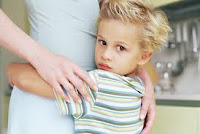Fears: Developmental Fears Children Face (based on certain age)
 |
| Developmental Fears Children Face |
The following are some of the most common developmental fears children face. If your child exhibits them, take him seriously, but don’t give him excessive attention.
The first year: Fear of strangers and separation from parents are primary fears. Other fears involve sudden loud noise, falling, animals, sleep and doctor.
The one-year-old: Many of the fears of the first year continue. Others that develop are fear of the dark, thunder and lightning, toilet training, and the bath.
The three-year-old: Fears of new situations, the dark, dogs, scary noises, separation from parents may continue. New fears revolve around the child’s developing imagination. Fear of monster is very common.
The four-year-old: New fears involve bad thoughts and loss of control such as bed-wetting. Primary is the fear of losing a parent.
The five-year-old: Many of the earlier fears persist, but they are based more in reality than previously. Losing mother or the caretaker parent remains the primary fear.
The six-year-old: Fears are more intense and specialized (big dogs). Fears of monsters, ghosts, wild animals, sleeping or staying alone, water and separation from parents are common. The six-year-old is also afraid of bodily injury and will often exaggerate minor injuries.
The seven-year-old: Normal fears include supernatural beings, the dark, the things seen on TV or in a movie, shadows, heights, spies, burglars, adoption, being late in school, new situations, and social rejections.
The eight-year-old: Many of the fears of the year before continue, but the 8-year-old is more likely to worry about the situation, often making himself face his fear as a means of resolving it.
The nine- to twelve-year-old: Most fears revolve around realistic situations such as tests in school, crime in the neighborhood, being left alone, natural hazards, bodily injury to self or loved ones, physical appearance, and social popularity.
The teen years: Typical fears include snakes, heights, the dark, deep water, getting lost in the woods, and being alone. Primary fears concern social performance sexuality.
As your child matures, use good stories and people’s experiences to teach him to face his fears. There is nothing your child should fear about, eventually he will outgrow his struggles and overcome them. As responsible parents, do something to get rid of the fears your children face.
Back to Home Page
Back to Home Page
Labels: Developmental fears, Family Issues, Fears, Fears children face









0 Comments:
Post a Comment
Subscribe to Post Comments [Atom]
<< Home